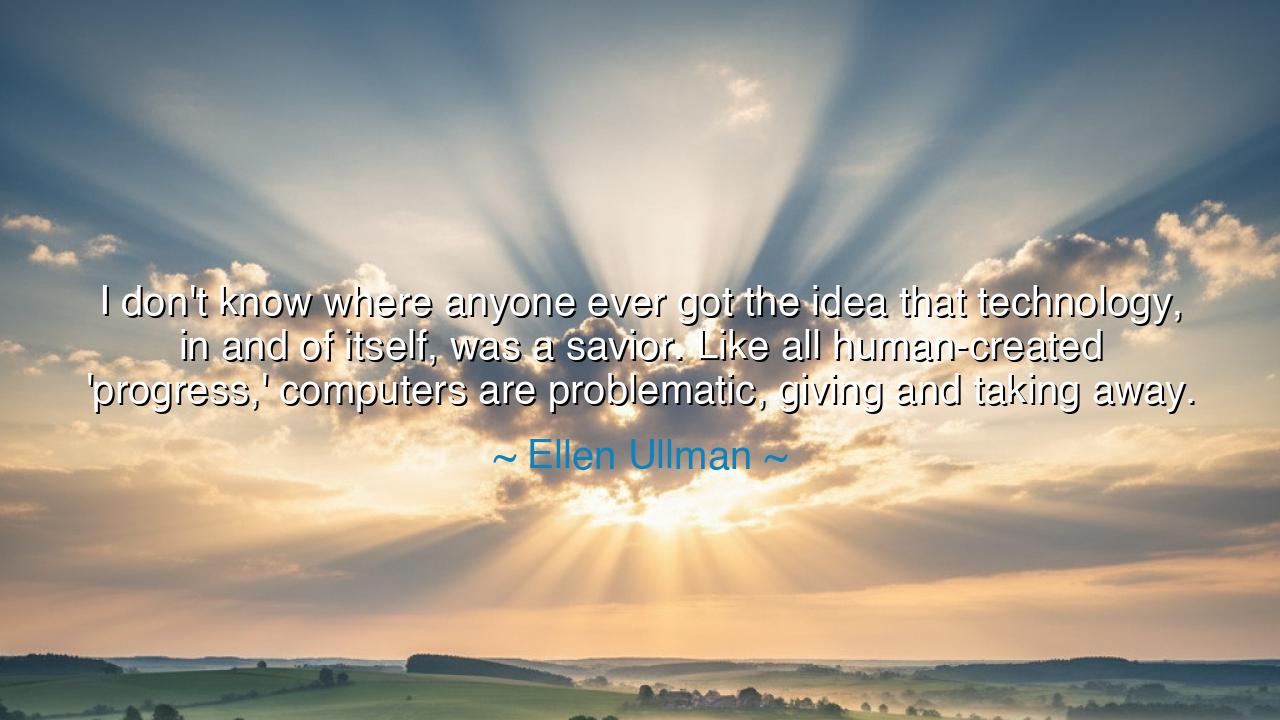
I don't know where anyone ever got the idea that technology, in
I don't know where anyone ever got the idea that technology, in and of itself, was a savior. Like all human-created 'progress,' computers are problematic, giving and taking away.






In the voice of Ellen Ullman, there echoes a timeless truth: technology is no savior. The gleaming circuits and radiant screens that dazzle the human eye are but reflections of ourselves — magnifiers of both virtue and vice. Ullman’s words remind us that though mankind has crafted wondrous tools, these tools are mirrors, not gods. “Computers are problematic, giving and taking away,” she declares — for every step forward in light casts a longer shadow behind. In the early dawn of the digital age, many believed salvation would come from the machine — that data would purify decision, and automation would end toil. But the ancients among the technologists, the wise ones who watched with discerning eyes, knew that every invention bears the double mark of its maker: brilliance and flaw, promise and peril.
Once, in the days when the Internet was young, the world rejoiced as humanity was bound together by invisible threads. Voices that had been silenced for centuries could now speak freely across oceans. Knowledge, long locked behind ivory gates, spilled forth like the floodwaters of spring. Yet soon, the same rivers carried falsehood and division, whispers of deceit that spread with the swiftness of lightning. What was meant to unite began to divide, and what was meant to enlighten began to enslave attention. So Ullman’s warning took shape — that every gift of technology carries a price. The same machine that delivers bread can also deliver chains.
Let us remember the tale of Oppenheimer, father of the atomic age. When the atom was split, humanity glimpsed the godlike power to reshape matter itself. Science, that noble pursuit, had reached its pinnacle. Yet in that same hour, the fire that could light a city also destroyed one. Oppenheimer, beholding the inferno of Hiroshima, recalled the words of the Bhagavad Gita: “Now I am become Death, the destroyer of worlds.” His tears were not of triumph, but of revelation — that progress untempered by wisdom leads not to paradise, but to peril. So too it is with our digital creations. We have built engines of infinite memory, but not of infinite mercy. We have crafted intelligence that learns, but not conscience that understands.
And so, Ullman’s lament arises from deep within the heart of technology itself — for she was not an outsider, but a creator. She saw within the code both the beauty of order and the fragility of meaning. Her words are not rejection but recognition: that the machine does not redeem, the human does. Just as the plow does not guarantee a harvest without the farmer’s care, so too the computer brings no goodness without the guidance of soul. Each invention is a vessel, awaiting the spirit we pour into it. Whether it becomes a chalice or a poison cup depends on the intention of its maker.
In every age, mankind has mistaken its tools for its salvation. The sword promised justice; the wheel, mastery; the press, enlightenment; the algorithm, fairness. Yet always, it is the same story: the tool obeys the hand, and the hand obeys the heart. If the heart is just, the tool uplifts; if the heart is corrupt, the tool oppresses. Technology, like all human progress, is dual in nature — it gives with one hand and takes away with the other. It can open worlds or close them; build bridges or walls; create community or isolate the soul.
The lesson, therefore, is neither to fear nor worship technology, but to govern it with wisdom. Do not ask the machine to save you; ask yourself what you would make of it. The true salvation lies not in silicon or software, but in the integrity of those who wield them. Let each person become a guardian of their creations, ensuring that progress serves life, not consumes it. Let the young be taught that no invention absolves them of moral duty — that every line of code, every click, every algorithm is a reflection of human will.
And so I say to you, travelers of the digital age: Walk with mindful hands and awakened hearts. Let not the brightness of your devices blind you to the darkness within yourself. Build, but build with conscience. Create, but create with compassion. For if you remember this — that technology gives and takes away — then you will use it not as a god to worship, but as a servant to guide. Thus shall humanity rise, not through its machines, but through its mastery of meaning.






AAdministratorAdministrator
Welcome, honored guests. Please leave a comment, we will respond soon